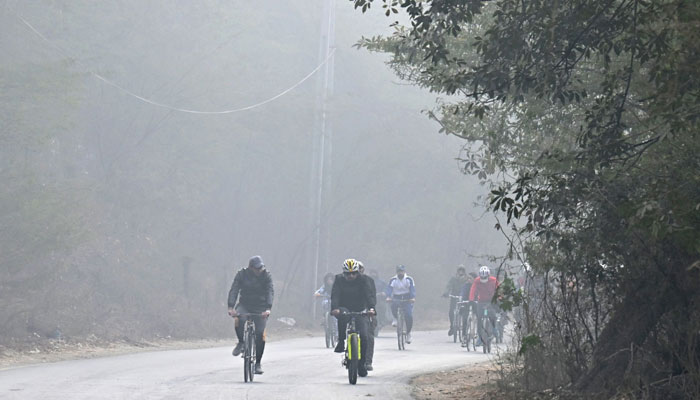Cyclists risk their lives on Islamabad Expressway
Islamabad : Islamabad’s ever-busy Expressway is seeing an unusual trend. As the sun rises over the federal capital, we see a growing number of cyclists weaving their way through the fast-moving traffic of Islamabad Expressway, one of the busiest and most hazardous roads in the city. With little to no cycling infrastructure in place, these cyclists are risking their lives in the absence of safe, designated lanes.
“Whether for fitness, recreation, or daily commuting, cyclists are increasingly turning to the Expressway as their only viable option. The absence of alternative routes has become a major concern for Islamabad’s cycling community, who say the road’s current conditions are not only unsafe but also reflect a broader neglect of sustainable urban transport,” says Wardan Ali.
“I have no choice but to cycle on the Expressway. It is dangerous, but there is no dedicated infrastructure anywhere in the city. The city’s planning seems entirely car-centric. We are just asking for the right to share the road safely,” says Amir Abbas, a tech professional and avid cyclist.
“With limited cycling infrastructure in the capital, enthusiasts, commuters, and delivery workers alike are turning to the Expressway, the city’s most hazardous road for non-motorized transport as speeding vehicles pass riskily close,” says Naqi Ali.
“The CDA has yet to allocate any dedicated cycling lanes on the Expressway or other major roads of the city. Although the authority has previously announced intentions to develop green mobility corridors, implementation has remained slow. Public health experts warn that this growing trend, if ignored, could lead to serious consequences,” says Burar Abbas.
“Cycling promotes physical and mental well-being and should be part of an inclusive urban mobility policy. However, without proper infrastructure, cyclists are extremely vulnerable to accidents and injuries,” says Laraib Ali, a public health researcher at a university.
“With Islamabad striving to brand itself as a smart and eco-friendly capital, many believe that embracing cycling infrastructure is both a necessity and a natural step forward. However, until serious policy action is taken, Islamabad’s cyclists remain on the edge quite literally,” says Harsam Raza.
“I’ve been cycling on the Expressway for the past year. It is risky, but there is no alternative. The Margalla tracks are great for mountain biking, but for road training or commuting, this is all we have,” says Amir Zaidi, a software developer and weekend cyclist.
“In recent months, social media groups and cycling communities have been vocal about the need for dedicated cycling lanes. Hashtags are gaining traction, putting pressure on city planners and the Capital Development Authority (CDA),” says Batool-e-Izra.
Ummul Banin, a public health expert at a university, says, “Cycling should be encouraged in urban environments. It promotes fitness, reduces traffic congestion, and is environmentally friendly. But without safe infrastructure, it becomes a hazard instead of a solution.”
-
 Giant Tortoise Reintroduced To Island After Almost 200 Years
Giant Tortoise Reintroduced To Island After Almost 200 Years -
 Eric Dane Drops Raw Confession For Rebecca Gayheart In Final Interview
Eric Dane Drops Raw Confession For Rebecca Gayheart In Final Interview -
 Trump Announces New 10% Global Tariff After Supreme Court Setback
Trump Announces New 10% Global Tariff After Supreme Court Setback -
 Influencer Dies Days After Plastic Surgery: Are Cosmetic Procedures Really Safe?
Influencer Dies Days After Plastic Surgery: Are Cosmetic Procedures Really Safe? -
 Eric Dane Confesses Heartbreaking Regret About Daughters' Weddings Before Death
Eric Dane Confesses Heartbreaking Regret About Daughters' Weddings Before Death -
 Nicole 'Snooki' Polizzi Reveals Stage 1 Cervical Cancer Diagnosis
Nicole 'Snooki' Polizzi Reveals Stage 1 Cervical Cancer Diagnosis -
 Hilary Duff’s Son Roasts Her Outfit In New Album Interview
Hilary Duff’s Son Roasts Her Outfit In New Album Interview -
 Alexandra Daddario, Andrew Form Part Ways After 3 Years Of Marriage
Alexandra Daddario, Andrew Form Part Ways After 3 Years Of Marriage -
 Eric Dane Rejected Sex Symbol Label
Eric Dane Rejected Sex Symbol Label -
 Avan Jogia Says Life With Fiancee Halsey Feels Like 'coming Home'
Avan Jogia Says Life With Fiancee Halsey Feels Like 'coming Home' -
 Kate Middleton's Role In Handling Prince William And Harry Feud Revealed
Kate Middleton's Role In Handling Prince William And Harry Feud Revealed -
 Tucker Carlson Says Passport Seized, Staff Member Questioned At Israel Airport
Tucker Carlson Says Passport Seized, Staff Member Questioned At Israel Airport -
 David, Victoria Beckham Gushes Over 'fiercely Loyal' Son Cruz On Special Day
David, Victoria Beckham Gushes Over 'fiercely Loyal' Son Cruz On Special Day -
 Taylor Swift Made Sure Jodie Turner-Smith's Little Girl Had A Special Day On 'Opalite' Music Video Set
Taylor Swift Made Sure Jodie Turner-Smith's Little Girl Had A Special Day On 'Opalite' Music Video Set -
 Eric Dane Says Touching Goodbye To Daughters Billie And Georgia In New Netflix Documentary
Eric Dane Says Touching Goodbye To Daughters Billie And Georgia In New Netflix Documentary -
 Channing Tatum Reveals What He Told Daughter After Violent Incident At School
Channing Tatum Reveals What He Told Daughter After Violent Incident At School




